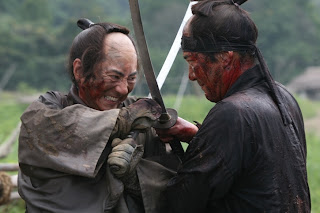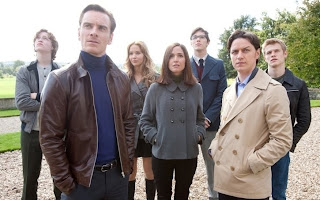
Tuesday, June 28, 2011
Bad Teacher

Saturday, June 25, 2011
13 Assassins

Friday, June 24, 2011
Submarine

Friday, June 10, 2011
Super 8

It's all the more fitting that the film is about a Goonies-like gang of prepubescent auteurs trying to shoot the awesomest mutant zombie flick ever. The writer/director, who's as bossy as David Lean, is Charles (Riley Griffiths) and even though he's got the home-made light kit, the boom mike, the make up designer and the necessary will power to make a great film; he's gonna need "production values" if he wants to win a local film festival. His wish is granted when a midnight shoot at a train station turns into a most epic train derailment and explosive calamity. But what seems like an accident at first -- turns out to be a covert government operation involving the transportation of one of the CIA's best-kept secrets.
While happily immersed in the wonder of the supernatural, "Super 8" is sure to keep at least one toe in the real world at all times. The film's protagonist is Joe Lamb (Joel Courtney), a sweet kid grieving his mother's death and dealing with the growing distance it's caused between him and his father, Deputy Jack (Kyle Chandler). One of the cleverest things about the movie is its self-knowingness. Charles' astutely realizes that without a wife for his zombie-hunting, detective main character, the audience won't give-a-hoot if some flesh-hungry, undead creature devours him. Abrams shrewdly takes his own advice and casts Elle Fanning (Somewhere) as Alice -- she joins the gang to play the wife, but becomes more tween love interest than anything else. Just in case we didn't care about Joe Lamb (or that special locket his mother used to wear), a recently deceased parental and a burgeoning puppy love are there to ensure our sympathies.
Though, I do wish we were a little more invested in Joe Lamb. It would have made the film's syrupy sweet final moments even sweeter. But "Super 8" has a lot of other things on its mind. Steven Spielberg -- a man who famously shot super 8 war films as a wee lad -- produces and J.J. Abrams is obviously smitten with his phenomenal cohort. Everything from kids on bikes taking on a whole occupation force of shady government stooges to a mysterious monster kept out of frame and out of sight until the last thrill-filled minutes, made me think of old Spielberg and his immeasurable impact on the industry. Yet the way Spielberg has the ability to make fantasy so palpable you can reach out from your seat and touch it, alas, remains merely an aspiration for J.J. Abrams.
But the beauty of Abrams' work in "Super 8" is that emulation is not only the name of the game, but also the heart of it all. Homage to George A. Romero and his fear-the-government, Cold War shtick, run rampant, both as a part of the kids' hilarious, "shoe-string", grind house wannabe; and as a part of the film's narrative fabric -- when amoral military phantoms quarantine their small Ohio town. Yet, somehow, Abrams' film comes off as neither parody nor pretentious pastiche, but a product of passion, and as the crashes thud and tears flow with an extra dose of loving exuberance, we can't help but be carried away by it. And that's the whole point: The kids have found themselves running amok in the big-budget, high octane movie of their wildest cinematic dreams. J.J. Abrams was once just like them and he remembers what it was like to be a kid dreaming of what he could do with a large crew and a studio budget. He may have since switched from super 8 to IMAX, but he hasn't forgotten that imagination is still the most magical resource there is.Thursday, June 9, 2011
X-Men: First Class

Before "X-Men: First Class", the X-Men film franchise had almost entirely deflated. After director Bryan Singer left the series in 2003, the resulting entries, Last Stand and Origins Wolverine, were middling at best. Fox Studios has done the smart thing with the story's overly treaded ground (in fact, it's the same thing I do when a piece of writing just isn't working): They scrapped it! And started over from the beginning. They've brought in a new director, Matthew Vaughn (Kick-Ass), a new tone, a new era, and an almost entirely new crop of mutant warriors. Luckily, the two who've made a return are, in my opinion, the best: Magneto and Professor X. And, being a prequel and all, we get to follow these two ideological nemeses from childhood to friendship to an even more action-packed falling out than Anakin and Obi-Wan.
I have to admit, when I first saw a pint-sized Magneto (then named Erik Lehnsherr) walking the wet dirt road to Auschwitz and an even punier Charles Xavier stalking his kitchen for a midnight snack, I thought I was doomed to endure an X-Men version of the Muppet Babies. But the adult counterparts replace these miniature genetic wunderkinds rather quickly. And in fact, the depiction of their youths is the easily the most important element to defining their characters. The teeny psychic Charles takes in a homeless, blue skinned shape-shifter named Raven (soon to be Mystique) out of the kindness of his ten-year-old British heart. Erik, at the same time, watches his mother get shot down by a Josef Mengele wannabe-type Nazi scientist, who takes an interest in Erik's ability to magnetize himself to all things metallic. From the get-go, we know why Xavier dedicates his later life to geniality and understanding, just as we know why Magneto dedicates his to anger and retribution.
By the time they're adults, Charles (James McAvoy) has become a geneticist at Oxford working to figure out the science behind his own altered existence. Erik (Michael Fassbender) is on a global vendetta to eradicate all remaining traces of Nazi-dom, including the murderous Angel of Death who killed his mother -- a guy named Sebastian Shaw (Kevin Bacon). Since the two protagonists are only in their twenties, Vaughn and his screenwriters have a whole new (far out) milieu to work with. Charles eloquently hits on Oxford coeds with hilariously rehearsed Greg-Bradyisms like, "I think that mutation is pretty... groovy." And by the time he links up with Erik, the overarching conflict becomes the fight to stop global Cold War annihilation. Scenes in eccentrically over-decorated debriefing halls reminded me of Kubrick ("There's no fighting in here! This is the war room!"). And the subtitle, Super Secret Covert Base, made me think of Dr. Evil's underground volcano lair.
Despite the film's Holocaust portrayal (which was a little exploitative for my taste) and its ever-present ruminations on "being different", its tone is playfully close to those aforementioned films. Inside jokes about Xavier's hair and cameos by previous X-Men participators made "First Class" a lively semi-goof on its own mythology. Then Xavier starts recruiting mutants for a secret CIA program and a new "class" of adolescents shows off their powers in sequences of hilariously destructive frat-kid behavior. Other pluses: A fantastic cast that has Oscar nominees McAvoy and Jennifer Lawrence (as Raven) shining in roles balancing sprightliness and private contemplation. The film's acting trophy, however, goes to Michael Fassbender whose wrathful trance of a performance is so tactile it's warming.
"X-Men: First Class" moves at a splendidly energetic and enjoyable pace, but I can't help feeling like there's probably a better movie in there somewhere -- one with less characters, less banal and redundant dialogue about feeling like a freak (all the series' insightful themes are rendered effectively idiot-proof); and more discourse between Charles and Erik's polarizing viewpoints regarding the better and worse angels of our nature. As I've always seen the two characters as a representation of peoples' inclination to treat others as less than human (both in the small and the extreme). Charles believes in the possibility of redemption. But Erik was on the front lines during humanity's darkest hour and is not necessarily wrong for considering the world's cold treatment of what it doesn't understand. More than any previous installment "X-Men: First Class" needs to ask: Which side are you on?
Monday, June 6, 2011
Pirates of the Caribbean: On Stranger Tides

★½/★★★★
Sunday, June 5, 2011
Kung Fu Panda 2

★★★/★★★★
The return of Po, Jack Black’s ursine martial arts messiah from 2008’s wonderfully rambunctious yet wistful cartoon Kung Fu Panda, is as welcome as the return of a dear friend. We’re happy to see, right off the bat in the follow up Kung Fu Panda 2, that after three years of ass kicking as China’s much prophesized Dragon Warrior, Po still trains hard by stuffing copious vegetable dumplings into his bulging snout. A hefty tub of good-natured id, Po is driven by his animalistic impulse to gorge his insatiable belly. But that belly, a rotund hillock of black and white fur, is, and always was, the source of Po’s power (he is the Kung Fu Panda after all). And when he belly-flopped the whiskers off Thai Lung, the feline antagonist from the original film, it was an ecstatic moment of the Neo-Stopping-Bullets variety. For the creators of this animated action sequel to forget what made Po such an audacious hero the first time around, would be a disservice to the audience as well as the character.
Luckily, they didn’t. Since going from a daydreaming noodle shop assistant to an established master of fast-hands weaponry, Po’s head has stayed surprisingly small (especially for a panda). And what makes him such a lovable underdog, even still, is that he is, really, just a hardcore fanboy living in his own action-movie reverie, fighting alongside his boyhood idols: The Furious Five. Even while he’s leading The Five – Tigress (voiced by Angelina Jolie), Crane, Mantis, Monkey, etc. – on an adventure to stop a gun-toting, genocidal peacock named Shen from destroying China with an arsenal of cannonry, Po can’t help gushing, slow-mo and mid-kick, over the sheer awesomeness of his dream come true. It taps into the transient wonder of childhood; Po, wide-eyed and grinning in a stupor, wears the same expression a kid might if he was catching a hail-mary from Peyton Manning or fielding grounders with Derek Jeter. Without the wonderfully conceived character of Po, the film is merely spectacle, yet with him, it’s exuberant animated jubilation.